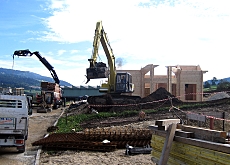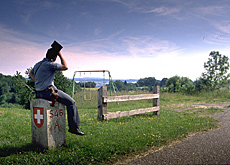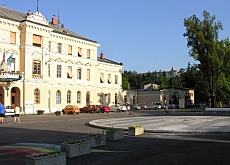Keeping a lid on wage dumping in Vaud

Fears of a flood of illegal workers and rampant wage dumping have dogged plans to open up the Swiss labour market to the ten new European Union countries.
Ahead of a nationwide vote on the issue on September 25, swissinfo joined a team of building-site inspectors in canton Vaud to find out whether concerns are justified.
It’s just after 9am when we pull up unannounced in front of a half-built chalet on a hillside above the town of Vallorbe.
A five-strong team of carpenters are taking their first break of the day, cracking open a packet of biscuits, slugging on bottles of mineral water and enjoying the early morning sunshine.
It’s a casual, relaxed scene and they barely raise an eyebrow when my two companions introduce themselves.
“There have been cases when we’ve arrived and the workers have legged it. At least we haven’t had to chase after anyone,” says D Sansonnens.
Sansonnens and his partner P Josseron [they requested that their first names be held back] have been working together since 1999 when the canton, unions, employers and the national accident insurer, Suva, set up the inspection team.
Their job is to visit building sites across the western Swiss canton to ensure that no one is working illegally, labour and safety regulations are complied with and workers are getting a fair wage.
This task has taken on a different slant since the lifting of restrictions on workers from the original 15 EU members in June last year.
This allows citizens of these countries to work in Switzerland for up to 90 days without a work permit as long as they register with the authorities.
Illegal workers
The change – along with the possible extension of the labour accord to the ten new EU members – has been overshadowed by fears of a wave of cheaper foreign labour, especially in the construction sector.
But according to Sansonnens, this has not been the case so far.
“We have seen a very slight increase in the number of offences but we cannot say there has been a massive influx of European firms coming here,” he told swissinfo.
“The most common offence committed by European firms is that they do not pay the salaries in force in this country.”
And it is not just a matter of a few francs here and there. Sansonnens and Josseron have come across cases where foreign workers were paid SFr8 ($6.3) an hour – well below the minimum SFr22-25 laid down by collective-labour contracts covering the building trade in Switzerland.
In a recent high-profile case, a trade union revealed that workers building Formula One ace Michael Schumacher’s SFr35-million villa in canton Vaud were getting half the going rate in Switzerland.
Not only does this mean that foreign workers are losing out, but it also means that foreign firms can seriously undercut Swiss rivals when bidding for contracts.
Getting answers
Armed with a simple questionnaire, the two inspectors begin running the rule over the carpenters who all come from neighbouring France.
“How much do you earn? How many hours a week do you work? Do you work on Saturdays? Do you receive a 13th month’s salary at the end of the year? How much paid holiday do you get?” asks Sansonnens.
Christophe, 31, the head carpenter, reveals that he picks up €10.80 (SFr16.75) an hour – almost half the SFr30.75 he should be getting in Switzerland.
It turns out that he is also missing out on his 13th month’s salary and half his travelling expenses to which he is entitled under Swiss regulations.
I ask him what he makes of the fact that his boss is diddling him out of more than SFr100 a day.
“If that’s the law then that’s the law. At the end of the day this is good news for me, but whether my boss pays up is a different matter,” says Christophe.
But it’s not all good news for the carpenters from France. As former denizens of the building trade, Sansonnens and Josseron don’t miss a trick.
None of the carpenters is wearing a safety helmet, the driver of the timber-delivery truck does not have the necessary licence for Switzerland and there is no scaffolding around the chalet.
Permission to work
A quick call to the cantonal employment office also reveals that three of the carpenters have been refused permission to work in Switzerland and the other two are not even registered.
Once the inspectors have filed their report, their boss will be hearing from the authorities in Vaud.
“Nothing was in order and if he continues like this, he risks having problems working in Switzerland in the future,” warns Josseron.
Foreign firms found to be in breach of Swiss regulations risk up to a SFr5,000-fine. In serious cases they can be taken to court where they face up to a SFr40,000-fine and can be banned from Switzerland for up to five years.
Despite frequent promptings, neither of the inspectors is prepared to divulge which way they will be voting on September 25. As they rightly point out, it’s a secret ballot. But it is clear that a “yes” would be preferable from a professional standpoint.
According to Sansonnens, one of the advantages of a successful vote would be the appointment of 150 new inspectors across Switzerland.
“Personally, we don’t think there will be many more businesses trying to come here. But as there would be more inspectors and more checks, we should be able to cope with any increase and ensure firms pay the right wages.”
swissinfo, Adam Beaumont in Vallorbe
There are three building-site inspectors in canton Vaud.
Last year they filed between 400 and 500 reports.
A construction worker should earn at least SFr22 an hour in Switzerland.
Foreign workers are sometimes paid less than half of that.
Parliament has approved the extension of a labour accord with the EU to its newest member states: Latvia, Lithuania, Estonia, Poland, Hungary, the Czech Republic, Slovakia, Slovenia, Cyprus and Malta.
Unions, which were initially opposed to the idea, have backed the move after parliament approved additional measures to combat abuses in the labour market.
These safeguards include compulsory collective labour contracts, minimum pay and working conditions, and the appointment of 150 inspectors to check for abuses.

In compliance with the JTI standards
More: SWI swissinfo.ch certified by the Journalism Trust Initiative











You can find an overview of ongoing debates with our journalists here . Please join us!
If you want to start a conversation about a topic raised in this article or want to report factual errors, email us at english@swissinfo.ch.